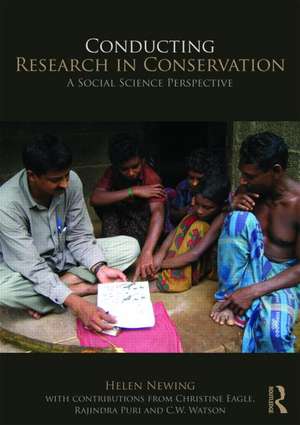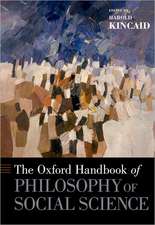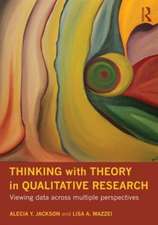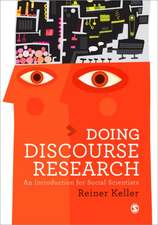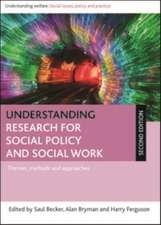Conducting Research in Conservation: Social Science Methods and Practice
Autor Helen Newingen Limba Engleză Paperback – 13 oct 2010
The first section on planning a research project includes chapters on the need for social science research in conservation, defining a research topic, methodology, and sampling. Section two focuses on practical issues in carrying out fieldwork with local communities, from fieldwork preparation and data collection to the relationships between the researcher and the study community. Section three provides an in-depth focus on a range of social science methods including standard qualitative and quantitative methods such as participant observation, interviewing and questionnaires, and more advanced methods, such as ethnobiological methods for documenting local environmental knowledge and change, and participatory methods such as the ‘PRA’ toolbox. Section four then demonstrates how to analyze social science data qualitatively and quantitatively; and the final section outlines the writing-up process and what should happen after the end of the formal research project.
This book is a comprehensive and accessible guide to social science research methods for students of conservation related subjects and practitioners trained in the natural sciences. It features practical worldwide examples of conservation-related research in different ecosystems such as forests; grasslands; marine and riverine systems; and farmland. Boxes provide definitions of key terms, practical tips, and brief narratives from students and practitioners describe the practical issues that they have faced in the field.
Preț: 374.59 lei
Nou
Puncte Express: 562
Preț estimativ în valută:
71.68€ • 75.37$ • 59.23£
71.68€ • 75.37$ • 59.23£
Carte disponibilă
Livrare economică 26 martie-09 aprilie
Livrare express 12-18 martie pentru 43.14 lei
Preluare comenzi: 021 569.72.76
Specificații
ISBN-13: 9780415457927
ISBN-10: 0415457920
Pagini: 400
Ilustrații: 54 black & white illustrations, 31 black & white tables, 7 black & white halftones, 47 black & white line drawings
Dimensiuni: 170 x 245 x 23 mm
Greutate: 0.73 kg
Ediția:1
Editura: Taylor & Francis
Colecția Routledge
Locul publicării:Oxford, United Kingdom
ISBN-10: 0415457920
Pagini: 400
Ilustrații: 54 black & white illustrations, 31 black & white tables, 7 black & white halftones, 47 black & white line drawings
Dimensiuni: 170 x 245 x 23 mm
Greutate: 0.73 kg
Ediția:1
Editura: Taylor & Francis
Colecția Routledge
Locul publicării:Oxford, United Kingdom
Cuprins
Section 1: Planning a Research Project 1. Introduction: Social Science Research in Conservation 2. Defining the Research Topic 3. Developing the Research Design 4. Sampling Section 2: Methods 5. Participant Observation 6. Qualitative Interviews and Focus Groups 7. Questionnaires 8. Documenting Local Environmental Knowledge and Change 9. Community Workshops and the PRA Toolbox 10. Participatory Mapping Section 3: Fieldwork with Local Communities 11. Preparing for Fieldwork and Collecting and Managing Data in the Field 12. The Role of the Researcher 13. The Ethical Issues in Research Section 4: Data Processing and Analysis 14. Processing and Analysis of Qualitative Data 15. Quantitative Analysis: Descriptive Statistics 16. Quantitative Analysis: Inferential Statistics Section 5: Writing up the Report 17. Writing up the Report 18. Final Dissemination and Follow-up
Recenzii
"Social research is vital for effective conservation. Here at last is an authoritative, clear and practical guide to conducting successful social reserach in conservation. The authors effectively blend state-of-the-art thinking in social research with practical examples from conservation projects around the world. A must have book for conservation researchers and practitioners." Dr Paul Jepson, School of Geography and Environment, University of Oxford.
"Conducting Research in Conservation makes a much needed contribution to the field. Well written and highly accessible, this introduction to conservation-relevant social science methods will serve as a valuable resource for novices and experts alike. In particular, its practical guidance will help conservation professionals to navigate the complexities of social science research in the ‘real world.’" Dr Michael B. Mascia, World Wildlife Fund, USA.
"Conducting Research in Conservation makes a much needed contribution to the field. Well written and highly accessible, this introduction to conservation-relevant social science methods will serve as a valuable resource for novices and experts alike. In particular, its practical guidance will help conservation professionals to navigate the complexities of social science research in the ‘real world.’" Dr Michael B. Mascia, World Wildlife Fund, USA.
Descriere
This is the first textbook on social science research methods for use in the expanding and increasingly multidisciplinary field of environmental conservation. It is divided into five useful sections and illustrated throughout with practical examples of conservation-related research from different parts of the world (Europe, the Americas, Africa, Asia, Australia) and different ecosystems (forests, grasslands, desert, marine and riverine systems, as well as farmland and home gardens). It will be an invaluable tool in the training of the next generation of conservation professionals.
